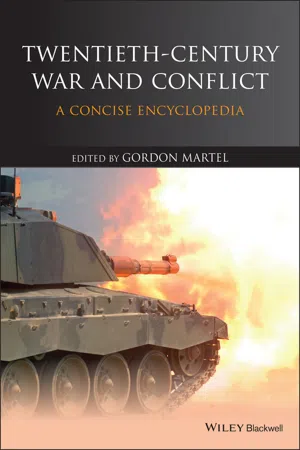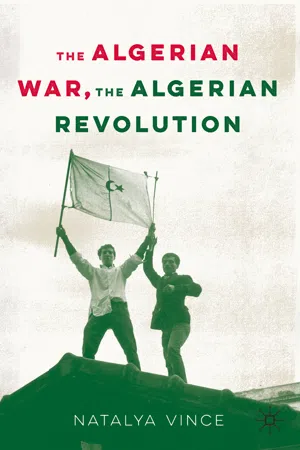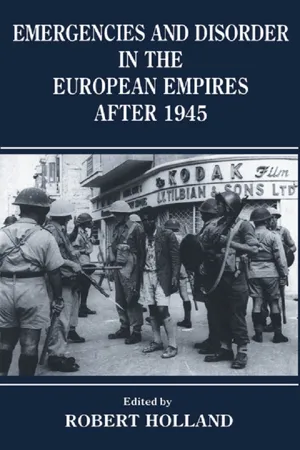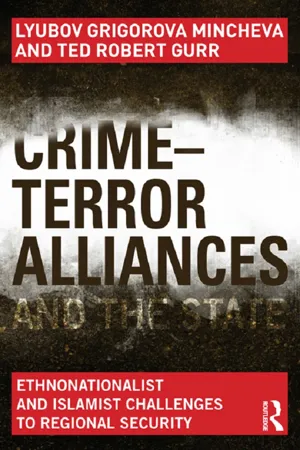Politics & International Relations
Algerian War
The Algerian War, also known as the Algerian War of Independence, was a conflict between France and the Algerian independence movements from 1954 to 1962. The war resulted in Algeria gaining independence from France and marked the end of over a century of colonial rule. The conflict had significant political, social, and economic implications for both Algeria and France.
Written by Perlego with AI-assistance
Related key terms
5 Key excerpts on "Algerian War"
- eBook - ePub
Twentieth-Century War and Conflict
A Concise Encyclopedia
- Gordon Martel(Author)
- 2014(Publication Date)
- Wiley-Blackwell(Publisher)
AAlgerian War of Independence (1954–1962)
BRIAN P. FARRELLThe Algerian War of Independence was one of the most controversial military conflicts associated with “decolonization,” the dismantling of European overseas empires after World War II. The great majority of Algeria’s population live in a long coastal plain along the southwestern shore of the Mediterranean Sea, and in mixed forest and mountain country intermingled with that coastal plain. Its location made Algeria coveted by ambitious empires throughout its history. Conflict between France and the Ottoman Turkish Empire prompted a French invasion in 1830, which framed the twentieth-century war of independence.French hegemony in Algeria produced three developments that made the ultimate war of independence unique, complicated, and controversial. First, France declared its Algerian territories to be part of metropolitan France itself, not overseas colonial territories. Second, a large population of European settlers put down roots in Algeria. Third, successive French governments treated Algeria as part of France, but denied full political and civil rights and equality to residents of Algeria other than the European settler communities.The Algerian population was diverse before France annexed the country. Berber peoples tended to live in the mountainous and desert areas, Arabs and Turks along the coastal plain. United to an extent by a shared religion, Islam, they were also frequently divided by disputes over land and customs. French rule was imposed by force in bitter campaigns stretching to the end of the 1840s. “Resistance” to French rule tended to be driven by local, ethnic, and religious factors, but did lay the foundation for an Algerian “national myth” of unified struggle against alien rule. The dispossession of non-Europeans from political and economic power reinforced that perception of suppressed national identity. But French efforts to integrate Algeria into French civilization also affected perceptions of identity. By the 1930s Algerians tended to divide into three broad groups. Many, led by Messali Hadj, wanted to oust French rule from Northwest Africa and restore independent states in Morocco, Tunisia, and Algeria. Many Muslim religious leaders saw the problem as a cultural struggle against French efforts to Europeanize a Muslim community. Their slogan was “Arabic is my language, Algeria is my country, Islam is my religion” (Horne 1977: 38). A smaller group of mainly urban professionals, led by Ferhat Abbas, distinguished between an ideal France of liberty, equality, and fraternity, and the inequality imposed by European settlers in Algeria. They argued there was no reason Algerians could not be Muslim and French at the same time, providing liberal France lived up to its progressive ideals. - eBook - ePub
- Natalya Vince(Author)
- 2020(Publication Date)
- Palgrave Macmillan(Publisher)
2006 , 45).The 1 November proclamation and the initial French response thus clearly set out the three interconnected arenas in which the War of Independence would be fought between 1954 and 1962. Firstly, this was a military confrontation, in Algeria and in mainland France. Secondly, this was a war between two competing claims: ‘Algeria is France’ versus ‘Algeria is the FLN’. Which of these claims was most true, or rather could be the most convincingly made to win ‘the hearts and minds’ of the population of Algeria, as well as international audiences? Thirdly, this war was never just a Franco-Algerian confrontation, it was also fought on the world stage and shaped by a shifting global context.Importing Ideas About Revolutionary Warfare into Algerian Local Networks, the French Military Response and the April 1955 State of Emergency
The founders of the FLN knew that they were not going to achieve independence by defeating the French army, one of the largest and best equipped in the world. Instead, the tactics it adopted were those which would come to be known in military-speak as revolutionary warfare or asymmetric warfare (Alexander and Keiger 2002 ; Vaïsse and Jauffret 2001 ). In asymmetric warfare , smaller powers (in this case, the FLN and its military branch, the ALN) use tactics which larger powers (in this case, France) are not expected to use, such as guerrilla warfare and urban terrorism. The goal is to wear down the political will of larger powers to remain, either through growing ‘war weariness’ of the human and material costs as the conflict drags on or through discrediting the moral authority of the larger power by exposing the tactics it uses to crush the weaker power (Mack 1975 - R. F Holland, Robert Holland(Authors)
- 2012(Publication Date)
- Routledge(Publisher)
The Origins of the Algerian War: The Reaction of France and its Army to the two Emergencies of 8 May 1945 and 1 November 1954 Jean-Charles Jauffret (Translated by Christina Watkins and Maria Sparling)On 22 November 1944, General de Gaulle, head of the temporary government of the Republic, enjoined the members of the Consultative Assembly in the following terms: 'Let us rebuild our power, from now on let it be our country's great crusade'.1 At the heart of this ambition lay the colonial empire, whose new-found unity was to be a condition of French domination for a decade. The clearly nationalistic aspiration to retain the Empire, which even gained the support of the communists in 1944-45, was nevertheless accompanied by a desire for reform. In his Constantine speech on the 12 December 1943, General de Gaulle outlined the framework for greater assimilation of the three Algerian regions within the national community, while in January-February 1944 the Brazzaville Conference pointed to association as the way forward for the remainder of the colonial territories. However, these reforms were based first and foremost on the principle of loyalty, the 'Great Nation' alone having the power to determine to what extent its people were to be emancipated. The French State could not allow any form of armed conflict. Such an attitude set little store by the Second World War which accelerated the course of history, the hopes created by the Atlantic Charter and the inevitable movement towards decolonization, which reached the point of no return at Dien Bien Phu in May 1954.On two occasions, 8 May 1945 and 1 November 1954, the Republic and its armed forces found themselves challenged by a Muslim Algeria impatient to throw off the shackles of colonization. How did the civil and military authorities react? The two events were very closely linked: the rebellion of 1954 was a direct result of the failed coup of spring 1945. This leads us to a new interpretation of the Algerian War derived from the publication of a series of army archive documents, the first volume of which was published in March 1990.2- eBook - ePub
- Lyubov Grigorova Mincheva, Ted Robert Gurr(Authors)
- 2013(Publication Date)
- Routledge(Publisher)
1Islam and Islamists played quite a different role in the revolutionary war that began in 1990 between Islamists and the military-dominated government in Algeria than in the Bosnian civil war.2 In Bosnia money and mujahedeen came from the outset from international Islamist and jihadist networks. In Algeria the Islamist challenge and its financing were indigenous. Only late in the conflict, when the jihadists had been largely defeated, did their survivors form an alliance with the al-Qaeda network. The issues that generated armed conflict in Algeria, the dynamics of crime–terror networks, and the outcomes are analyzed here.The Algerian revolutionary war has been analyzed from various perspectives. Proponents of the US-led war on terror see it as part of the West’s larger contest with militant Islam. Miriam Lowi uses it to evaluate an empirically derived theory of civil war causation that emphasizes economic opportunities and resources.3 Stathis Kalyvas challenges the assumption that rebel massacres of Algerian civilians were “senseless” and “random butchery,” and shows instead, using microevidence, that they are best understood as part of a rational strategy to punish and deter villagers in contested areas who did not support them.4 Two Norwegian researchers examine the Islamists’ support network among the Algerian diaspora in France and develop a model of the circumstances in which militants choose to use terror tactics against the “sanctuary” country.5This chapter, following the Unholy Alliances framework, explores factors conducive to the emergence of hybrid terrorist and criminal networks. Identity networks provide a setting for easy collaboration between criminal and terrorist groups. Ongoing armed conflicts create opportunities that such networks can exploit. In Algeria we show how political networks based on Islamic identity provided the rationale and organizational basis for opposition to a corrupt and autocratic state. Islamist doctrines and a mix of economic and political grievances together were the source of justifications and recruits for guerrilla and terrorist action. Both rebels and the regime had ample material motivations and opportunities. The regime aimed to protect the privileges and illicit fortunes acquired by its elite and their clients from their monopoly of oil revenues and control of large sectors of the economy. The rebels participated in widespread criminal activity within Algeria and internationally that for many became an end in itself. The international dimension is complex: the jihadists’ support and financial networks in France were disrupted in the 1990s by French security counter-measures, but since 2000 efforts have been made to rebuild their European networks, and the Algerian jihadists have joined a regional network of Islamist militants linked to al-Qaeda. We preface our analysis with a brief overview of the conflict.6 - eBook - ePub
- Lorenzo Veracini(Author)
- 2006(Publication Date)
- Pluto Press(Publisher)
6This chapter proposes a comparative analysis of two conflicts in which a settler project supported by a colonial power reluctant to relinquish control over an area it deems strategically and ideologically essential for its survival was/is opposed to a loosely centralized nationalist movement struggling for independence.7 In this context, a reading of French engagements in Algeria and the ways in which it shaped the institutional transition to the Fifth Republic may shed light on current contestations in Israel and in the Occupied Territories.8 The first section of this chapter proposes a number of departures for a comparative analysis; the second section outlines the development and deployment in an Algerian context of French anti-insurgency military doctrines and draws a parallel with Israeli repressive stances vis-à-vis Palestinian insurgency and demands. The third part addresses the issue of narrative in the current conditions of the Israeli–Palestinian struggle.Comparing Wars of Decolonization
A comparative approach should be aware of the obvious differences between Algeria in the 1950s and the current situation of Israel/Palestine. It should first consider a structurally dissimilar pattern of international relations, characterized now by unchallenged US hegemony and by an emerging neo-imperial strand in policies, sensibilities, postures and debates, as opposed to the much more developed anti-colonial rhetoric that was typical of US foreign engagements during the 1950s. Moreover, the guarantees the US has made available to Israel in its anti-insurgency campaign should be contrasted with the eventual discontinuation of support for France’s colonial struggle in Algeria and elsewhere. Unlike de Gaulle’s, Sharon’s leadership took advantage from the unparalleled support of the US administration, including a groundbreaking endorsement for settlement annexation in the West Bank. Besides Cold War politics, the role played by the US emerges as an essential factor for an understanding of the differences between the two contexts.9
Learn about this page
Index pages curate the most relevant extracts from our library of academic textbooks. They’ve been created using an in-house natural language model (NLM), each adding context and meaning to key research topics.




